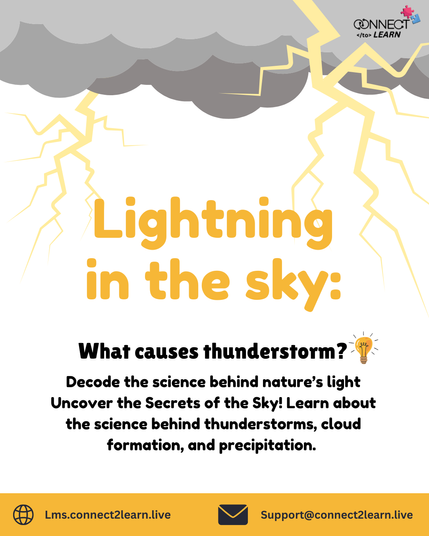"Thunderstorm Science: Nature’s Electrifying Show!"
Ever wondered what causes those loud booms and bright lightning streaks in the sky? Thunderstorms are powerful weather events that teach us about clouds, electricity, and air pressure. Dive into the science behind thunder, lightning, and rainstorms — and discover how they help balance Earth's atmosphere!
For more information, visit our website: https://lms.connect2learn.live/
#Thunderstorm #WeatherScience #STEMLearning #ScienceForKids #NatureScience
#WeatherScience
Earth’s atmospheric layers, from the troposphere’s storms to the thermosphere’s auroras, drive weather patterns and climate. Learn how pollution and ozone depletion impact these layers, in our comprehensive guide to atmospheric science. #WeatherScience
@AlaskaWx absoutely fascinating to hear the short (and profound) research talks on the livestream. Yes, I wrote Senators about the urgent need to get the weather balloons up from Nome and Bethel. #WeatherScience #Climate #ClimateCrisis
Just found out about the Weather and Climate Livestream: "Starting Wednesday at 1 p.m. ET and lasting for 100 straight hours, [US] climate and weather specialists will spend 15 minutes each talking about their work and why it is so valuable for the American people."
https://wclivestream.com/
#climate #ClimateScience #WeatherScience #science #research #meteorology #NASA #NOAA
Today's book recommendation is "Father Benito Viñes: The 19th-Century Life and Contributions of a Cuban Hurricane Observer and Scientist" by Luis E. Ramos Guadalupe, Translated by Oswaldo Garcia (2014).
From the publisher's description:
"Before Doppler radar and broadcast weather reports, Spanish-born Benito Viñes (1837–1893) spent decades observing the skies at Belen Observatory in colonial Cuba, routinely issuing weather reports and forecasts to local newspapers. And before storm trackers and emergency alerts, Viñes made it his mission to teach the public what he was learning about the weather. He developed the first network of weather observation stations in the Caribbean, and his research laid the groundwork for the hurricane warning systems we use today. His sometimes eerily accurate hurricane forecasts helped save many lives—earning him the nickname the Hurricane Priest.”
I first heard of the advanced hurricane forecasting skills at Cuban weather stations when I read a book about the Galveston hurricane of 1900. That book mentioned that the Cuban forecasts had been correct, when the U.S. forecasts had been far off track. This led me to curiousity about these Cuban weather forecasting pioneers, which led me to this little book.
Originally published in Spanish, this English translation published by the American Meteorological Society tells the story of a ground-breaking weather scientist.
Link to Book:
https://press.uchicago.edu/ucp/books/book/distributed/F/bo16945415.html
Today's book recommendation is "The Secret World of Weather" by Tristan Gooley (2021).
Before we can begin to understand climate change and all its ramifications, we should have a basic grasp of how weather actually works. This book is a very nice introduction to everyday weather effects that we see and feel all around us daily.
Why does it sometimes cool down at night, but sometimes does not? What do the changing shapes of clouds tell us about upcoming weather? What difference is there between wind direction at ground level and winds up at cloud level? How do clouds actually form?
The book is written for a non-scientist, without textbook language, so it's a pleasant read for anyone with a grasp of a few basic science concepts we learned in school. There are illustrations to help clarify the author's explanations, which is also helpful.
What was most interesting was that the book awakens our attention to observe overlooked facets of the world around us. Is there a nice breeze today? Pay attention to which direction it comes from, and whether it shifts as the day goes on.
When I was in high school, a half-century ago, my favorite science class was Earth Science, where we learned about weather, (along with water, erosion, and other related topics). Over the years, while my interest remained, a lot of the specific detail has blurred and seeped away. This book was a lively and engrossing refresher.
Link to book:
https://theexperimentpublishing.com/catalogs/winter-2023/the-secret-world-of-weather/
Hurricane season starts June 1: “The nation’s forecasting agency is in tatters as what could be a destructive hurricane season nears. Several current and former agency meteorologists told CNN they are concerned forecasts and life-saving warnings are not going to be issued in time.”
#Politics #USPolitics #NationalWeatherService #HurricaneSeason2025 #TornadoSeason #TrumpBudgetCuts #PublicSafety #WeatherForecastingThreatened #WeatherScience
https://www.cnn.com/2025/05/02/weather/nws-forecasting-layoffs-trump
With sound, I think of a sort of cross between echolocation and ripples on a pond. Three dimensions of travel, bouncing waves hitting ripples that themselves have bounced...
This is a great post, and really nice sounds!!
I wonder if some #physics or #weather #science #weatherscience person on here has a good grasp ofor approach to charting thunder-patterns!
First Successful Lightning Triggering and Guiding Using a Drone
https://group.ntt/en/newsrelease/2025/04/18/250418a.html
#HackerNews #FirstSuccessfulLightningTriggering #GuidingWithDrone #DroneTechnology #Innovation #WeatherScience
